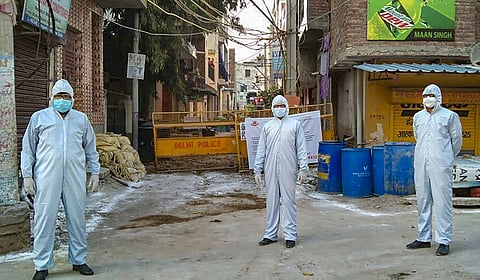

MADURAI: Be it a natural calamity or a pandemic, the Group-D staff are among the few who roll up their sleeves first. Being at the bottom of the government machinery, their work holds the key for any contingency planning. But, are we treating them right? Sadly, not. Their services remain underrated and unrecognised. What TNIE understood during the conversation with them is that more than claps and praises, they want real solution — permanent job and pay hike.
Around 530 Domestic Breeding Checkers (DBC workers), 155 urban health nurses and 100 anganwadi workers have been deployed to the city’s seven COVID-19 containment zones -- Melamadai, Narimedu, Thapalthanthi Nagar, Anaiyur, Thideer Nagar and Mahaboopalayam — to carry out the daily survey.
Speaking to TNIE, a DBC worker Malliga (name changed), who is involved in door-to-door surveys at Melamadai, said despite being in service for many years, they have neither been made permanent nor given a pay hike. “My salary remains the same for the last seven years. It’s just `8,000. While the government had made announcements of special allowances for healthcare and conservancy workers, we have been neglected despite being the frontline force,” she rued.
Another DBC worker Rani (name changed), who surveys Mahaboopalayam, says the workers are proud of being a part of the fight against the novel coronavirus. Not minding working an extra hour than the stipulated duty time, they check at least 50 houses every day. “We start as early as 7.30 am. A van picks us up from houses and drops at containment zones. The survey goes till 1.30 pm,” she said.
They collect the details of residents with co-morbid conditions and those with fever, cough, cold, respiratory illness and sore throat. Besides, they also teach the public a few respiratory exercises and give them tips to increase the immunity.
The collected data will be handed over to the designated medical officer in the nearby Urban Primary Health Centre (UPHC). “If any of the residents has symptoms of COVID-19, we notify the UPHC doctor, following which the doctor will visit the patient for treatment. If they are identified with major symptoms of Severe Acute Respiratory Illness (SARI) and high fever, the doctor will immediately refer the patient to Government Rajaji Hospital,” she added.
Speaking on the safety gear given to them, the workers said they were provided masks made of single layer cotton fabric along with gloves. However, they told TNIE that they don’t wear gloves. When asked, a DBC worker Valli (name changed) said, “The gloves are made of hard material that is ideal for conservancy workers. As one cannot jot down the details wearing such thick gloves, we don’t use them.”
On the challenges they face, the workers said visiting all the houses by foot under the scorching sun is an exhausting task. What makes things worse is that the lack of drinking water and toilet arrangements. “We get drinking water from the houses. At some houses, we get beverages and snacks. After the survey, the van drops us at our houses,” added one of them. From their survey, the workers have noticed one thing. It is the youth who break the curfew most. “Even when we try to make them understand the importance of staying home, they say the virus won’t affect them,” they said.
No permanent job, no pay hike
Speaking to TNIE, a DBC worker Malliga (name changed), who is involved in door-to-door surveys, said despite being in service for many years, they have neither been made permanent. “My salary remains the same for the last seven years. It’s just Rs 8,000. While the government made announcements of allowances for healthcare and conservancy workers, we have been neglected despite being the frontline force.”